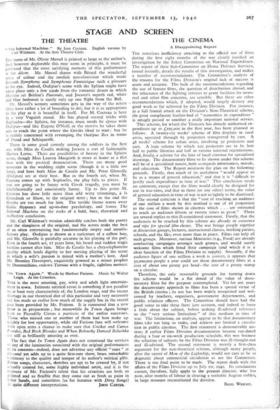STAGE AND SCREEN
THE THEATRE
g, The Infernal Machine." By Jean Cocteau. English version by Carl Wildman. At the Arts Theatre Club.
THE name of Mr. Oliver Messel is printed as large as the author's. And however deplorable this may seem in principle, it must be confessed that the most satisfying memory of this performance is the decor. Mr. Messel shares with Berard the wonderful sense of colour and the modish neo-classicism which made Seventh Symphony and Symphonic Fantastique such a pleasure to the eye. Indeed, Oedipus's scene with the Sphinx might have taken place only a few yards from the romantic desert in which Massine set Berlioz's Pastorale, and Jocasta's superb red, white and blue bedroorn is surely only up one flight from the Ball.
Mr. Messel's scenery sometimes gets in the way of the actors (they have rather a lot of bounding to do), but it is as appropriate to the play as it is beautiful in itself. For M. Cocteau is here in a very Voguish mood. He has played several tricks with Sophocles—the Sphinx, for instance, must needs be eprise with Oedipus—and like Eugene O'Neill or the movies he takes three acts to reach the point where the Greeks liked to start: but he is mainly concerned with revamping the Oedipus Rex in terms of Freud and Schiaparelli.
There is some good comedy among the soldiers in the first act, with Miss de Casalis making Jocasta a sort of fashionable Marion Lorne. There are possibilities of beauty in the Sphinx scene, though Miss Leueen Macgrath is more at home as a flirt than with the poetical denunciation. There are many good moments in the wedding night scene (though it is a little too long), and here both Miss de Casalis and Mr. Peter Glenville (Oedipus) are at their best. But in the fourth act, when M. Cocteau comes up with Sophocles, the play falls to pieces. If you are going to be funny with Greek tragedy, you must be wholeheartedly and consistently funny. Up to this point M. Cocteau has done little more than add witty trimmings, a la Girardouk or Shaw, to the original story ; but in the end the Greeks are too much for him. The terrific theme scares away Gallic flippancy and up-to-date psychology, and leaves The Infernal Machine on the rocks of a bald, bare, rhetorical and ineffective conclusion.
Mr. Carl. Wildman's version admirably catches both the poetry and the slanginess of the original, and the actors make the best of an often entertaining but fundamentally empty and unsatis- factory play. Oedipus is drawn as a caricature of a callow boy, and Mr. Glenville is painfully accurate in his playing of the part. Even in the fourth act, 17 years later, his beard and sudden tragic buskins cannot alter him. Miss de Casalis has a chryselephantine quality which lends dignity to her moving playing of the scene in which a wife's passion is mixed with a mother's love. And Mr. Bromley Davenport, exquisitely gowned as a minor prophet by Domenichino, endows Tiresias with a fragile, sightless menace.
"In Town Again." Words by Herbert Farjeon. Music by Walter Leigh. At the Criterion.
THIS is the most amusing, gay, witty and adult light entertain- ment in town. Intimate satirical revue is something if not peculiar to, at least very characteristic of, the London stage, and the recent shortage in our theatrical diet of this particular and very necessary salt has made us realise how much of the supply has in the recent past been provided by Mr. Farjeon. It is rumoured that a new show is in preparation ; but meanwhile In Town Again brings back to Piccadilly Circus a pasticcio of the earlier successes. Those who missed one or another of them had best make up quickly for lost opportunity, while old Farjeon fans will welcome with open arms a chance to make sure that Cricket and Cartes Postales, Bed Rock Blondes and When Bolonsky Danced Belushka are still as brilliantly amusing as ever.
The fact that In Town Again does not command the services of any of the luminaries associated with the original performances of its contents—indeed, does not advertise any official " stars " at all—and yet adds up to a quite first-rate show, bears remarkable testimony to the quality and temper of its author's satirical gifts. Revue songs, characters, sketches are apt to be created by, if not actually created for, some highly individual artist, and it is the measure of Mr. Farjeon's talent that his creations are both so Pointed and so flexible that they come out as fresh as paint in ether hands, and sometimes (as for instance with Dirty Songs)


























 Previous page
Previous page